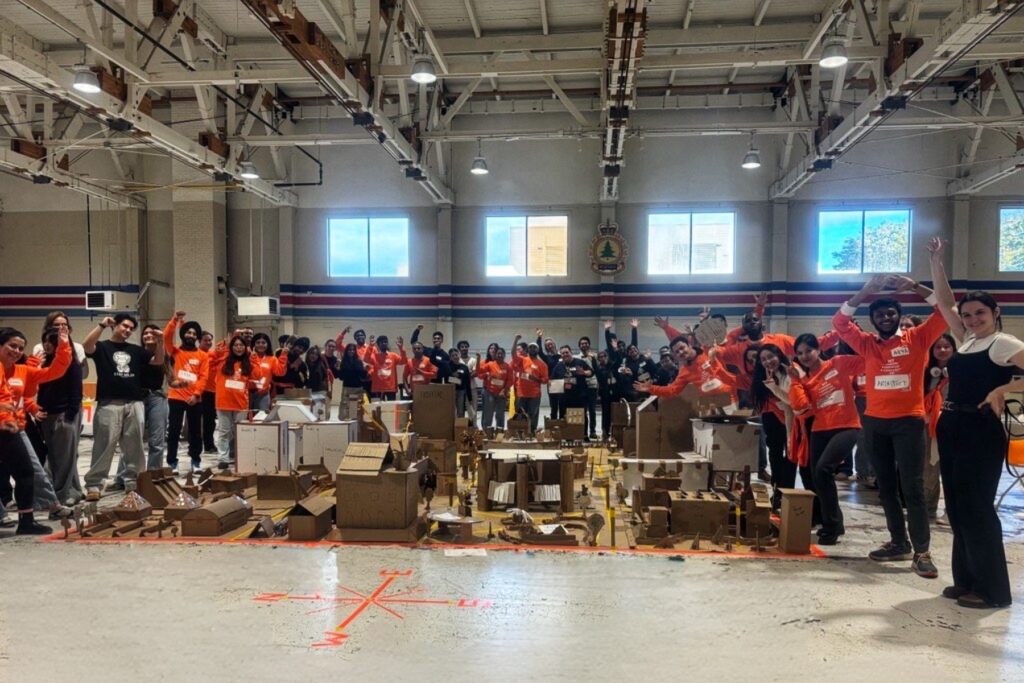Georgian students build conceptual net-zero community of the future in collaborative challenge
Dec. 5, 2024
Georgian College students participated in a unique hack-a-thon event to explore what a net-zero city block might look like in the year 2050. With over $3,000 in prizes, winning was achieved solely through the best collaborations for innovative, safe spaces and services of the future.
As part of a new initiative out of Georgian’s Research, Innovation and Entrepreneurship department called COLABORATORY, students, employees and community partners participated in the inaugural Essential Futures Challenge Community Building Hackathon on Nov. 26 at Canadian Forces Base (CFB) Borden.
The goal of the hack-a-thon was to co-design a fictional net-zero city called Glenville, Ont., in 2050. Net-zero means human activities release and remove the same amount of carbon dioxide from the atmosphere.
The Essential Futures Challenge is about more than envisioning a net-zero future. It’s about helping our students stay relational to our natural environment and build human connections as we continue to expand our digital footprints. This event showed that when we come together, we can better integrate technology to support the healthy design of our communities.
– Nicole Norris, Director, Social Innovation at Georgian

Hack-a-thon emphasizes collective problem solving, human wellness
Students from diverse academic areas took a month-long learning journey to participate in workshops facilitated by Georgian’s Social Innovation, #ChangeTheNow and Henry Bernick Entrepreneurship Centre teams to explore the essential skills required to create healthy and inclusive community spaces in a one-day design and build challenge.
Moving away from a traditional competition format, the event emphasized collective problem solving, empathy, cooperation, and consideration of human wellness. Students worked in small groups and were encouraged to collaborate, combining their collective knowledge, lived experiences and perspectives to propose creative and human-scaled solutions.
Participants presented their ideas to the other participants and members of industry, academia, and community organizations. Awards were presented in three categories:
- Sustainability Award: This team took net zero to the next level with a design demonstrating creative and viable solutions to environmental problems. Winners: Yumnam Sudipta Devi and Sahib Singh.
- Innovation Award: This team excelled with their creativity and problem solving. Their design used forward-thinking technology in elegant and surprising ways to solve important problems for the people inhabiting the fictional community. Winners: Chudasama Birva, Maria Cristine Mejia Bravo, Casper Hansen and Jasmin Lykke Kjeldaard.
- People First Award: This team put people at the heart of their design. Team members collaborated with each other and other teams to build something inviting, accessible and adaptable to the diverse needs of the people in the fictional community. Winners: Matthew Xavier Atticus Crante, Freya Nadine Huidemase, Emma Lan and Upashan Perera.
Students left the event not only with enhanced skills but also with a deeper understanding of how collaboration and empathy can drive progress toward a more sustainable future.
Georgian is proud to support the development of socially conscious, future-ready leaders through initiatives like the Essential Futures Challenge.
This Essential Futures Challenge was made possible with the support of the Business and Higher Education Roundtable, and, as a military-connected college, Georgian thanks CFB Borden and the Barrie Chamber of Commerce.